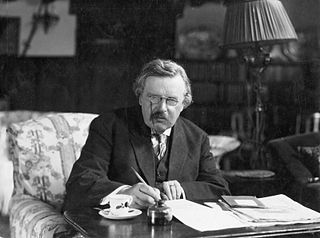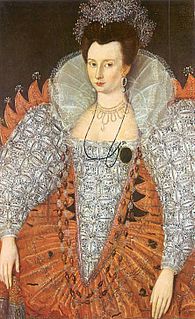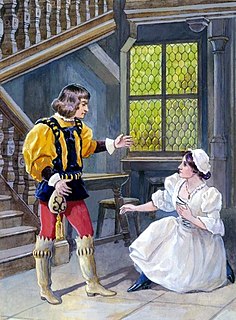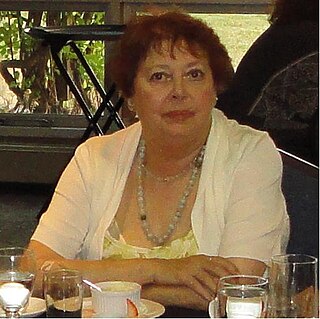
Gilbert Keith Chesterton was an English writer, philosopher, lay theologian, and literary and art critic. He has been referred to as the "prince of paradox". Time magazine observed of his writing style: "Whenever possible Chesterton made his points with popular sayings, proverbs, allegories—first carefully turning them inside out."

George Bernard Shaw, known at his insistence simply as Bernard Shaw, was an Irish playwright, critic, polemicist and political activist. His influence on Western theatre, culture and politics extended from the 1880s to his death and beyond. He wrote more than sixty plays, including major works such as Man and Superman (1902), Pygmalion (1912) and Saint Joan (1923). With a range incorporating both contemporary satire and historical allegory, Shaw became the leading dramatist of his generation, and in 1925 was awarded the Nobel Prize in Literature.

Utopia, Limited; or, The Flowers of Progress, is a Savoy opera, with music by Arthur Sullivan and libretto by W. S. Gilbert. It was the second-to-last of Gilbert and Sullivan's fourteen collaborations, premiering on 7 October 1893 for a run of 245 performances. It did not achieve the success of most of their earlier productions.

Man and Superman is a four-act drama written by George Bernard Shaw in 1903. The series was written in response to a call for Shaw to write a play based on the Don Juan theme. Man and Superman opened at the Royal Court Theatre in London on 23 May 1905, but it omitted the third act. A part of the act, Don Juan in Hell, was performed when the drama was staged on 4 June 1907 at the Royal Court. The play was not performed in its entirety until 1915, when the Travelling Repertory Company played it at the Lyceum Theatre, Edinburgh.
The Marconi scandal was a British political scandal that broke in mid-1912. Allegations were made that highly placed members of the Liberal government under the Prime Minister H. H. Asquith had profited by improper use of information about the government's intentions with respect to the Marconi Company. They had known that the government was about to issue a lucrative contract to the British Marconi company for the Imperial Wireless Chain and had bought shares in an American subsidiary.

Cecil Edward Chesterton was an English journalist and political commentator, known particularly for his role as editor of The New Witness from 1912 to 1916, and in relation to its coverage of the Marconi scandal.

Misalliance is a play written in 1909–1910 by George Bernard Shaw. The play takes place entirely on a single Saturday afternoon in the conservatory of a large country house in Hindhead, Surrey in Edwardian era England.
Christopher Newton is a Canadian director and actor and served as artistic director of the Shaw Festival from 1980 to 2002.
G.K.'s Weekly was a British publication founded in 1925 by seminal writer G. K. Chesterton, continuing until his death in 1936. Its articles typically discussed topical cultural, political, and socio-economic issues yet the publication also ran poems, cartoons, and other such material that piqued Chesterton's interest. It contained much of his journalistic work done in the latter part of his life, and extracts from it were published as the book The Outline of Sanity. Precursor publications existed by the names of The Eye-Witness and The New Witness, the former being a weekly newspaper started by Hilaire Belloc in 1911, the latter Belloc took over from Cecil Chesterton, Gilbert's brother, who died in World War I: and a revamped version of G. K.'s Weekly continued some years after Chesterton's death by the name of The Weekly Review.
Lillian Groag is an American playwright, theater director, and actress. Her plays include The Ladies of the Camellias, The Magic Fire, and The White Rose.

Getting Married is a play by George Bernard Shaw. First performed in 1908, it features a cast of family members who gather together for a marriage. The play analyses and satirises the status of marriage in Shaw's day, with a particular focus on the necessity of liberalising divorce laws.
The Shaw Festival is a major Canadian theatre festival in Niagara-on-the-Lake, Ontario, the second largest repertory theatre company in North America. Founded in 1962, its original mandate was to stimulate interest in George Bernard Shaw and his period, and to advance the development of theatre arts in Canada.

The Dark Lady of the Sonnets is a 1910 short comedy by George Bernard Shaw in which William Shakespeare, intending to meet the "Dark Lady", accidentally encounters Queen Elizabeth I and attempts to persuade her to create a national theatre. The play was written as part of a campaign to create a "Shakespeare National Theatre" by 1916.

La Basoche is an opéra comique in three acts, with music by André Messager and words by Albert Carré. The opera is set in Paris in 1514 and depicts the complications that arise when the elected "king" of the student guild, the Basoche, is mistaken for King Louis XII of France.

Rodelle Selma Horwitz Weintraub is an American author, editor, professor, and public speaker. The focus of her career includes specializing in the works of George Bernard Shaw. She is the assistant editor of The Shaw Review. In 1982, the West Chester University of Pennsylvania the Weintraub Center for the Study of the Arts and Humanities was endowed by Weintraub and her husband, Stanley Weintraub. The center holds a collection of their books, papers and memorabilia. She was one of the founders of the Bellefonte–State College Jewish Community Center, established in 1955, which became known as Congregation Brit Shalom. In 1963, she was named as the president of the synagogue, which established her as the first woman in the US to head a Jewish congregation.

Passion, Poison, and Petrifaction is a short play by Bernard Shaw, subtitled The Fatal Gazogene: a Brief Tragedy for Barns and Booths. It is a comic mock-melodrama, written to raise funds for charity. It has been revived occasionally, in tandem with other short works by Shaw or by other playwrights.

The Inca of Perusalem, An Almost Historical Comedietta (1915) is a comic one-act play written during World War I by George Bernard Shaw. The plot appears at first to be a fairy-tale like story about a fantastical "Inca", but it eventually becomes obvious that the Inca is Kaiser Wilhelm II of Germany.

The Fascinating Foundling (1909) is a short comic play by George Bernard Shaw. Shaw classified it as one of his "tomfooleries". He was so unimpressed with his own work that the published text was humorously subtitled "a Disgrace to the Author".

Ouvertüre zum Märchen von der schönen Melusine, Op. 32, is a concert overture by Felix Mendelssohn written in 1834. It is generally referred to as Die schöne Melusine in modern concert programming and recordings, and is sometimes rendered in English as The Fair Melusine.
Philip Hagemann is an American composer and conductor.












